By Raymond Hebert
Thomas More University
Part 17 of our Series, “Retrospect and Vista II”: Thomas More College/University, 1971-2021
Sr. Mary Laurence Budde, SND, was one of the “legends” of Villa Madonna/Thomas More College. Most of her career (over 30 years) was spent as a faculty member in the Department of Biology. Along with Dr. Fred Humphreys, William Volker, and Dr. William Bryant, she helped to make the Biology department one of the shining stars of TMU.
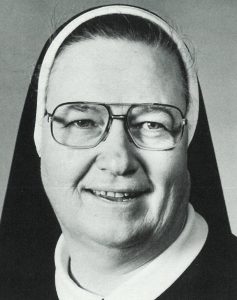
Sr. Mary Laurence Budde, professor of Biology and Academic Dean. (Thomas More University Archives. )
As a faculty member, “she was instrumental in establishing a freshwater biology lab on the Ohio River for environmental studies for the Beckjord and Zimmer plants. Comparisons of fish populations was the main thrust (and still is) of the nonpartisan study” (Academic Dean wins Albright Award,” The Messenger, May 26, 1985, p.16). Within the Biology department, she was the microbiology expert responsible for beginning the transfer programs for Medical Technology students from two-year community college programs to TMC’s four-year program. She also served on fourteen visiting teams for the Southern Association of Colleges and Universities for regional accreditation.
Sr. Mary Laurence was a Sister of Notre Dame of Covington who, after graduating from Villa Madonna College, completed her master’s degree in Biology from the Catholic University of America, with a major in Zoology and minors in Bacteriology and Botany. She then joined the faculty of Thomas More College, as “an instructor in Microbiology, Genetics, Radiology and Biological Literature” (TMU Archives). She also served as an administrator at TMC, as an interim and then permanent Academic Dean (1982-1985). Finally, she returned full time to her first love, teaching biology, stating that, “as Dean I replaced myself in microbiology, too well, so I’ll be spending next semester reading and studying in order to prepare a program in genetics” (Messenger, May 1985).

Dr. Fred Humphreys, professor of Biology. (Thomas More University Archives.)
It is notable that Sr. Budde was an active participant at the National Science Foundation and Atomic Energy Commission Institute in Radiobiology at the University of Michigan (1961), the National Science Foundation Research Participation Program for College Teachers at the University of Illinois (1964), and a National Science Foundation Atomic Energy Commission Program for College teachers in Physical Biology at Cornell University (NY). The latter also led to other projects at Cornell through the National Science Foundation Academic Year Expansion Research Program (1968-1970). Her work focused on “Calcium and Phosphorus Metabolism in Fish as studied by Radioactive Tracer Techniques.
In 1969 and 1970, Sister Mary Laurence participated in multiple training courses through the Robert A. Taft Engineering Center in Cincinnati. In 1981, she was honored with an award by the Kentucky Council on Higher Education “for her outstanding service and contributions to Kentucky Higher Education,” the only Northern Kentuckian to receive the award at that time (“TMC Educator Receives Award,” March 24, 1981, Kentucky Post). Sister Laurence published several papers from her participation in these programs in biological journals. She also delivered papers at academic meetings.
Among her other awards, Sr. Budde received an Outstanding Education National Award, the Outstanding Educator in Ecology Award, and the Thomas More College Distinguished Alumni Award. She was a nominee of the Outstanding Women of Northern Kentucky, the recipient of the prestigious A.D. Albright Award for the Outstanding Administrator of Northern Kentucky (1985), and the Thomas More College and Greater Cincinnati Consortium of Colleges and Universities (GCCCU) Outstanding Teacher of the Year (1989). Also in 1989, she received a Women of the Sears-Roebuck Foundation’s “Teaching Excellence and Campus Leadership Award” (1989).
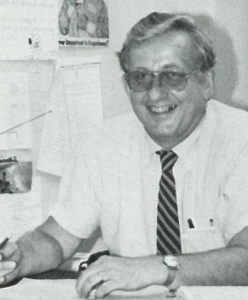
William Volker, professor of Biology. (Thomas More University Archives.)
For the latter, Sr. Laurence was one of 700 female faculty members recognized nationally for “resourcefulness and leadership as a private college educator.” Later that year, as celebrated in the December 1989 issue of Fort Mitchell Living, “Sister Laurence was to receive a $1,000 grant. Thomas More College also received $10,000 for a faculty development project” (p. 22). Appropriately, it was all part of a well-deserved way to return to teaching after her service as academic dean in the mid-1980’s.
Anecdotally, having been a faculty member and chairperson during Sr. Laurence’s Academic Dean years, I was always struck by her fairness, her consistency, and her energetic work ethic. At the same time, she did not tolerate laziness or mediocrity. An example can be found in one of the documents located in her Archives file, during her year as the Interim Academic Dean/Dean of the Faculty.
In a memo entitled “Class Dismissal Time,” she wrote to the faculty:
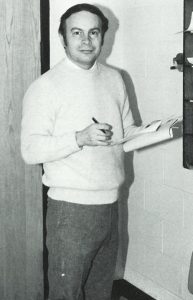
Dr. William Bryant, professor of Biology. (Thomas More University Archives. )
“The College has a contract with students when they register in courses, so that the teacher in those courses will fulfill a time obligation. Recent telephone call complaints indicate that some evening classes are not giving the student full time of instruction to which the student is entitled. Please check the time for beginning and ending your classes for which you have been contracted. Failure to fulfill these time obligations is a serious breach of your contract and an injustice to the students in the classes where the instructors take the unauthorized liberty of being late or not coming at all, or of dismissing early. Cooperation in these matters has been excellent on the part of conscientious teachers. The continued disregard by some faculty will lead to financial reductions in their payment for teaching (non-teaching?)” (Memo to all full and part-time faculty especially faculty teaching in the evening classes, October 18, 1978, TMU Archives).
Sr. Budde was much, much more than her research, awards, and administrative service. To young professors, Sr. Budde was a kind and caring mentor, protective of their budding careers and never wishing to place them in harm’s way. For instance, when Dr. Paul Tenkotte of the History department was caught in the crossfire of a newly proposed program — International Studies — she rolled into action as president of the faculty senate. While a faculty colleague was lambasting Tenkotte and the proposed program, she tapped Paul on the shoulder and kindly whispered in his ear, “Don’t worry. Don’t respond. I’ll handle this.” And she did, with diplomacy and skill. The program passed overwhelmingly.
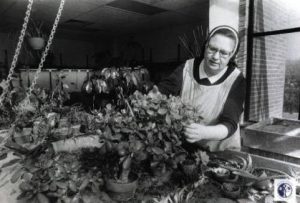
Sr. Mary Laurence Budde working in the Thomas More College greenhouse. (Courtesy of the Kenton County Public Library.)
To colleagues in the Biology department and throughout the college, Sr. Budde was a friend. Jeanne Pike of the TMC library enjoyed playing cards with Sr. Budde, whom she called “Sr. Larry.” After sister’s retirement, when she needed to use a wheelchair, Jeanne had a wooden handicapped ramp installed at her house so that “Sr. Larry” could continue to visit, play cards, and watch Reds and Bengals games on television.
To her students, Sr. Budde was “Sr. Larry” or “Big Larry,” the latter a term of endearment referring not only to her imposing stature but more importantly to her big spirit and compassionate heart. She loved teaching and expected the best of her students. She spent many summers mentoring them at the college’s Biology Field Station.
The students who served there remember how much she loved Cincinnati Reds’ baseball, never missing an opportunity to follow them on the radio. Suffering from bad hearing, she would turn the volume dial way up on her radio. Sometimes her mother, also a Reds fan, visited her at the field station, enabling them to share their Reds’ enthusiasm together. Back at Thomas More for the academic year, Sr. Budde always enjoyed attending Thomas More basketball and football games. She had a ready smile for all students she passed in the hallways, greeting them by name, and stopping to talk to them.
Sr. Mary Laurence Budde, SND, always had time for others, whether students, faculty, staff, or complete strangers. We remember her as one of Villa Madonna/Thomas More College’s “legends.”
Dr. Raymond G. Hebert is a Professor of History and Executive Director of the William T. Robinson III Institute for Religious Liberty at Thomas More University. He has just completed his 46th year at Thomas More and, with that background, will now serve as the General Editor of the official history of Thomas More College/University from 1971-2021. With a projected title of RETROSPECT AND VISTA II, it will serve as the sequel to Sr. Irmina Saelinger’s RETROSPECT AND VISTA, the history of the first 50 years of Thomas More College (formerly Villa Madonna College). He can be contacted at hebertr@thomasmore.edu .
We want to learn more about the history of your business, church, school, or organization in our region (Cincinnati, Northern Kentucky, and along the Ohio River). If you would like to share your rich history with others, please contact the editor of “Our Rich History,” Paul A. Tenkotte, at tenkottep@nku.edu. Paul A. Tenkotte, PhD is Professor of History at Northern Kentucky University (NKU) and the author of many books and articles.
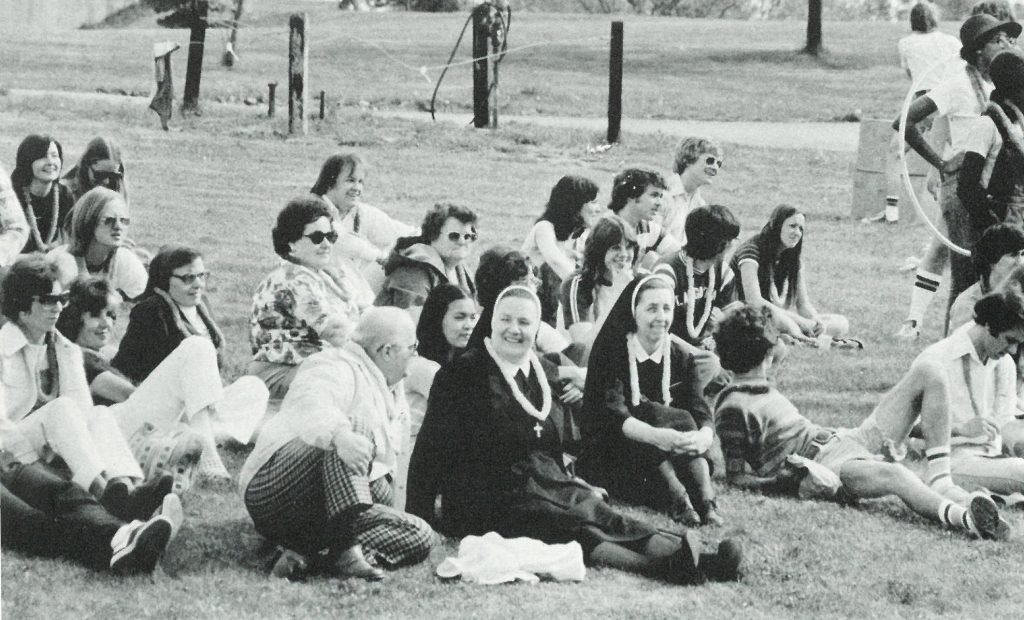
Sr. Mary Laurence Budde, pictured center, with a group of students. (Thomas More University Archives)

























What about Dr. John Ferner in the Biology Department? I’m puzzled why this article doesn’t mention him. He was an excellent instructor and mentor and taught at TMU for many years.